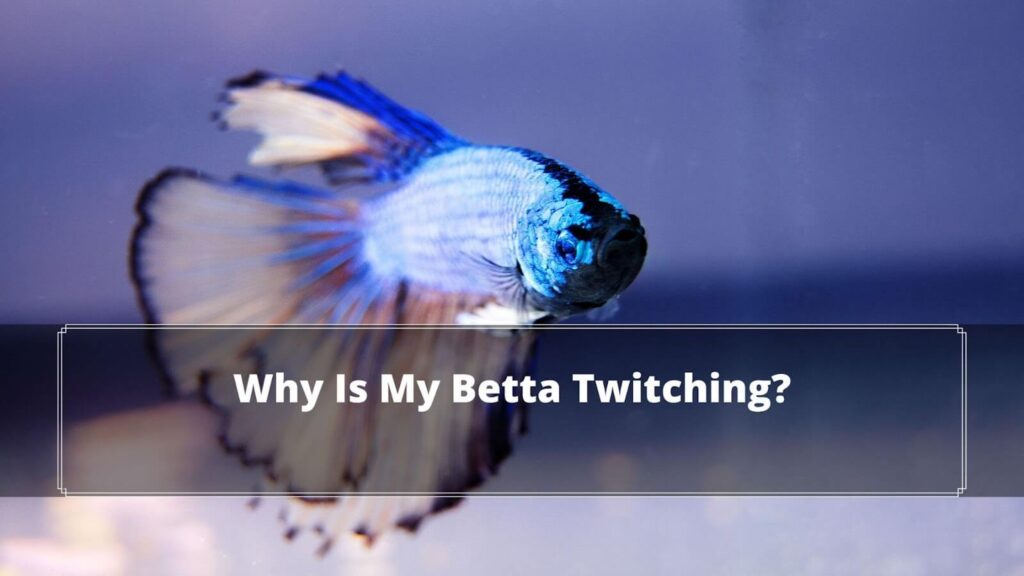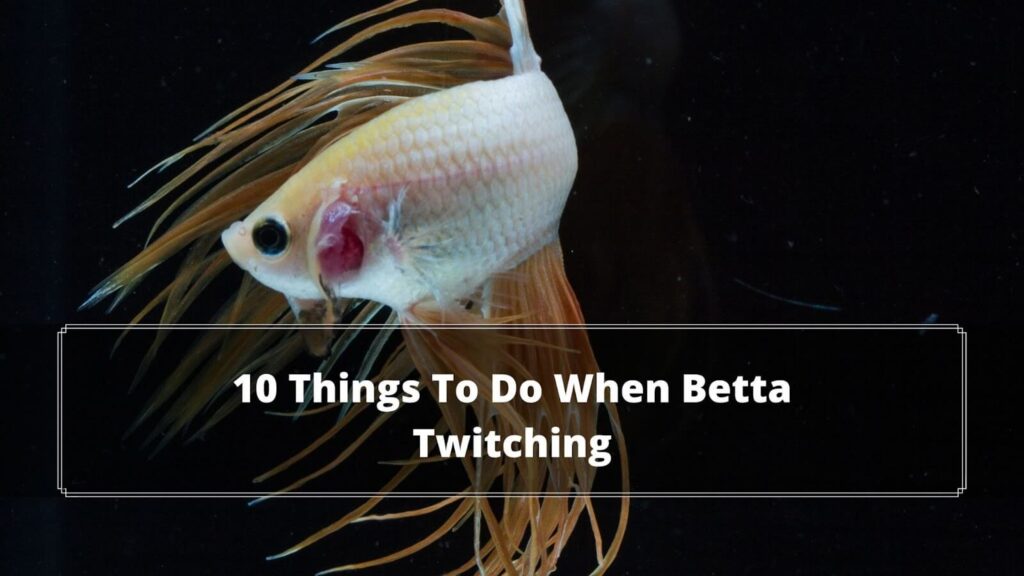Have you noticed those moments when your betta starts to twitch? Maybe you cannot figure out why your betta has been fiddling for a while. Well, in this case, you are not alone! So don’t worry :). Betta moving erratically in her tank is a common occurrence that all fish owners experience – at least those who own bettas.
The good news is that we have done extensive research and found many reasons your betta could be doing this. Therefore don’t panic or jump to any action. In this article, we will talk about the five reasons, what you should do to prevent it & why betta fish twitch after a water change.
Betta Fish Twitching
Before we continue to learn the five primary reasons why betta twitch, you need to know what exactly twitching is. Twitching is a spontaneous muscle contraction in which your betta’s body works in a rapid, jerky spasm.
This involuntary action is performed by betta to tense and relax her muscles. Betta’s twitching is more frequent in her pectoral fins and mouth. The body may also exhibit jerking motion, inflating, deflating, and eye darting.
If it is all accompanied by rapid breathing, your betta is infected. If the twitching is accompanied by signs like discoloration, heavy breathing, swelling, or redness, it means an underlying health issue. Thus, call your vet.
Why Is My Betta Twitching?

Betta twitches because of various reasons. Twitching can be a sign of underlying health issues. It can also be caused by stress from the new fish introduction or any environmental change in their tanks.
Bettas may also twitch when they are being aggressive. Dirty tanks or water changes can also be the reason.
5 Reasons Why Is My Betta Fish Twitching?
Let’s discuss the primary reasons behind your fish’s twitching behavior.
Betta Fish Twitching After Water Change
If you have just changed the water inside your betta tank without cleaning, it can lead to poor circulation. Thus, it will increase the dissolved waste product concentration that may harm your betta.
Water change can also affect oxygen levels, causing the fish to twitch, so ensure good filtration and aeration inside their tank to keep them healthy. If your tank is un-aerated, it is likely to have dissolved waste product buildup that might be causing many health problems in your betta.
And unfortunately, twitching is just one of the underlying health issues and symptoms. When changing the water, if you don’t maintain the quality, it can cause excessive stress, leading to many health problems, including twitching. The health issues may eventually affect the betta’s attractive appearance. For instance, if you start to observe that your fish is losing its lovely color, this is likely due to a stressful change in its environment.
Aquarium water quality is crucial for keeping a betta’s fish environment healthy. Even a sudden change in your water tank’s water condition can stress your betta out, even if it is a mature aquarium with a well-established ecosystem.
Disrupting it with water change without maintaining its quality, nitrate levels, temperature, and oxygen will lead to excessive stress for your fish. Hence, It is vital to regularly plan a water analysis of your betta’s tank.
Any abrupt water change or low nitrate level stresses your bettas, causing them to twitch. In addition, elevated ammonia or low levels of oxygen will also contribute to stress. As bettas are delicate fish in aquariums, they need appropriate water tanks and specific water chemistry to live a long, healthy, and happy life.
Therefore, being a responsible fish owner, always keep that tank clean with appropriate ecosystems and water chemistry. It’s common for a betta to twitch if the tank’s water chemistry is inappropriate. Do check whether your aquarium water is acidic or soft.
Betta Twitches When Something Is Attached To Her Body.
Another excellent reason for your betta to twitch is aquarium ornaments like plants, algae, or something like their food gets attached or stuck on her body. When your betta is attached to something, it acts as an irritant that causes stress and twitching.
Therefore, it is essential always to visit your betta and check for any foreign object in the body that might be stuck and causing her to twitch.
Betta Twitching When Swimming: Spastic Movements
If your betta twitches when swimming, it is a natural part of her behavior. Betta twitching when swimming is known as spastic movements. It is caused by stimulation such as vibration or water flow from the filter installed in their aquarium. Activities are also every day when bettas are hungry or stressed. If you bettas severely starve, she will move erratically in an attempt to catch your attention.
Spastic movements are nothing else than this and are caused by movement and vibrations. Aquarium bettas use sensory organs on each side of their head, known as lateral lines.
This helps them detect such vibrations and movements in their surrounding water. Suppose you have not given them breakfast or lunch, twitching results from hunger. It can also be caused by external factors like ammonia buildup or low oxygen levels, but fish are small and able to overcome and adapt to challenges.
So, find out and address what’s wrong in their tanks, and your bettas will soon return to normal. Some bettas may also perform spastic behavior or say’ twitching if they perceive a threat. Even if there is no threat, aquarium bettas are used to create imaginary predators even if there are none.
Your Bettas Twitch A Lot When She Is In Extreme Stress
If there has been a sudden change to their environment, your betta is likely to twitch simply due to stress. Another reason that might be causing stress to your betta is you have recently reshifted her.
The board bettas may also twitch due to insufficient physical activity or stimulation in their aquarium surroundings. You can quickly remedy this by adding more hiding places and decorations.
You can also try locating some plants to make her environment more enjoyable. If you have been not feeding your bettas enough, it can be the reason for stress. Feeding is essential in the winter month when the days are shorter. This is because bettas need more energy to keep their body and metabolism up in cold water.
Your Fish Aquarium Is Overcrowded
Do you know that overcrowding is a widespread problem for many homeowners that their owners are unaware of? If your aquarium is poorly maintained, overcrowding can also be considered one of the mistakes that cause your pet to twitch a lot or swim away from each other.
It will cause extreme stress and aggressive behavior towards each other in betta. Stressed bettas may start switching. Therefore, you must do a few things if this is the cause. The first thing is to separate the aggressive fish and excessive hidings that might take up space in the tank.
Then, get a new tank and divide your fish as you like in each tank. Make sure to keep the quality the same in terms of condition, temperature, oxygen, and nitrate level. Any sudden change may stress your fish out when relocating some fish to a new tank due to a lack of space.
10 Things To Do When Betta Twitching

For novice owners who have just noticed their face twitching, it can be hard to tell if it’s just a specific movement or a sign of stress. Whatever it is, here are a few things you can do to improve and lessen her chance of getting injured.
- Make sure to keep enough room for each fish to swim around instead of bumping into Each other. Never overcrowd the tank.
- Always maintain nitrate level; if it is high, look for a vet solution. Always keep the water surface clean.
- Make sure you clean your betta’s tank. As you clean their tank, you prevent as many diseases as possible from appearing in your fish. One of the reasons for betta’s twitching is dirty tanks. So it would help if you kept it clean.
- Always check the water quality, like its temperature, nitrate level, water level, ammonia level, and equipment like filter condition, etc. Fresh water tanks are essential to keep your betta healthy as a sick fish can affect all your bettas living in the same aquarium.
- If you are unsure why betta is twitching all of a certain in front of you, then try feeding some food. She might be hungry and trying to catch your attention by spastic movement or twitching.
- Check the light and if it is too much, keep your bettas in the as dark and calm environment as possible. Bettas don’t like light too much.
- Consider improving the water circulation or adding an air store in your betta tank to check if it’s working. If it doesn’t, consult aquarium specialists for a better ecosystem.
- Always watch out for disease because one infected betta can sicken others. Look if there is any damage to your betta’s skin cell where bacteria usually occurs.
- Consider adding some vitamin supplements to your betta’s style.
Conclusion
I hope I tried to give you all the information about why my betta fish is twitching. After knowing all the possible reasons and tips, what can you do to help them? If your betta is still twitching after a few weeks, you must take action.
The best way is to quarantine your fish twitching a lot and then take it to your local veterinarian to gather some advice. I hope you liked this article and considered sharing it. See you in the other article till then take care and goodbye.

94% of pet owners say their animal pal makes them smile more than once a day. In 2007, I realized that I was made for saving Animals. My father is a Vet, and I think every pet deserves one. I started this blog, “InPetCare”, in 2019 with my father to enlighten a wider audience.

